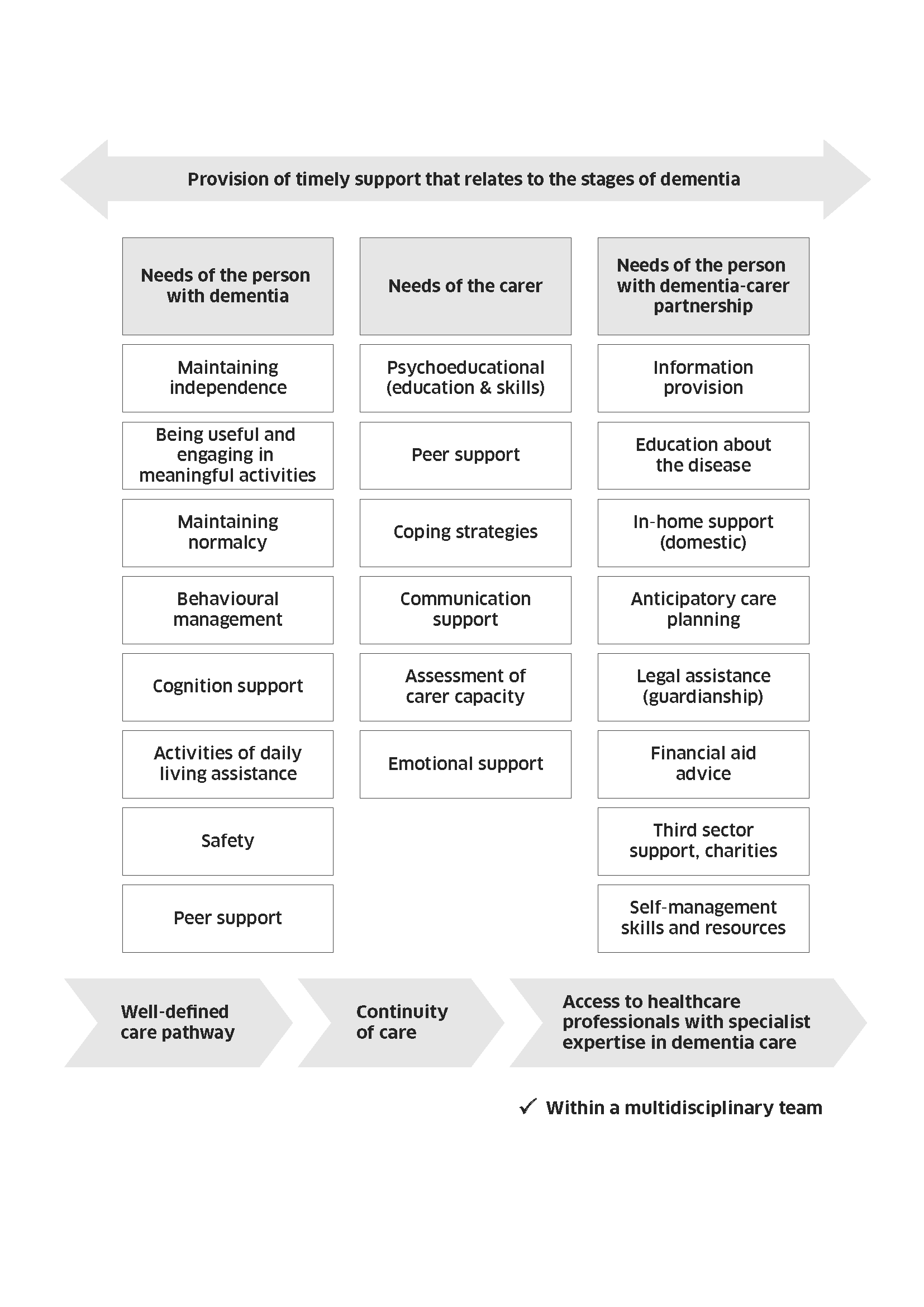Needs and unmet needs from postdiagnostic support

Overview of post diagnostic support to address the needs of the person with dementia, the carer and the person with dementia-carer partnership

Open dementia postdiagnostic support overview in new tab.
Recommendations for postdiagnostic support for unmet needs

Postdiagnostic support should address the needs of the person with dementia, carers, and the person with dementia–carer partnership.

Postdiagnostic support for people with dementia should include:
- assistance with activities of daily living to maintain their ‘normal life’ in the community, for example to maintain their identity, relationships, social life, ability to continue living in their own home, staying active and healthy and engaging in meaningful activities
- support for managing mood changes and stress and distress
- support for memory loss and declining cognitive function (eg the ability to retain shortterm information)
- help to balance safety with the need to remain independent, and facilitate normality and daily life
- education about the disease
- anticipatory care planning.

Postdiagnostic support for carers should include:
- emotional support
- psychoeducation
- timely information relating to the stages of dementia, access to services and where to find further reliable information
- practical help, such as coping strategies to preserve normality for both themselves and the person with dementia
- family support
- domestic support at home
- involvement in care planning.
 Postdiagnostic support for the person with dementia-carer partnership should include:
Postdiagnostic support for the person with dementia-carer partnership should include:
- communication support so the person with dementia can express their symptoms and needs and carers to can understand their needs (eg when something is wrong or causing distress), particularly in the advanced stages of dementia
- help to manage stress and distress (eg agitation and aggression)
- development of self-management skills and signposting to self-management resources
- help to achieve a balance between safety and retaining autonomy and independence,eg for the person with dementia walking outside, alone continuing to drive, medicationmanagement, impaired judgement and memory-related difficulties relating to activitiesof daily living, kitchen safety, stress and distress (extreme apathy or aggression)
- anticipatory care planning
- a well-defined care pathway and continuity of care
- access to GPs and healthcare professionals with specialist expertise in dementia care orcare of older people.

Postdiagnostic support needs to be flexible, sensitive and tailored to the needs of the person with dementia and their carers.
 Health and social care professionals should signpost people with dementia and their carers to:
Health and social care professionals should signpost people with dementia and their carers to:
- non-statutory organisations (eg charities/voluntary organisations) that offer social andemotional support
- reliable information sources including websites and social media (blogs, online forums).

Health and social care professionals should access education about dementia and its management, including communication skills and person-centred approaches to care
Health and social care professionals should consider the postdiagnostic support needs of the person with dementia as part of a holistic assessment that includes any other risk factors and comorbidities that should be considered and appropriately addressed.
Health and social care professionals should be aware of potential communication difficulties for people, particularly in the advanced stages of dementia. Health and social care professionals may need enhanced communication skills training to communicate effectively with people with advanced dementia.
The format of any information shared should be tailored to the needs and preferences of the person with dementia and their carers. Consider literacy and language, additional support needs and cultural sensitivity.
Information points for providing postdiagnostic support
Repeat information given at diagnosis about the long-term impact of dementia on the person with dementia and their carers to ensure understanding.
Discuss any safety concerns with the person with dementia, carers and family, and whether the person with dementia is at risk of going missing. If this is a concern, consider discussing completion of Police Scotland’s Herbert Protocol form.
